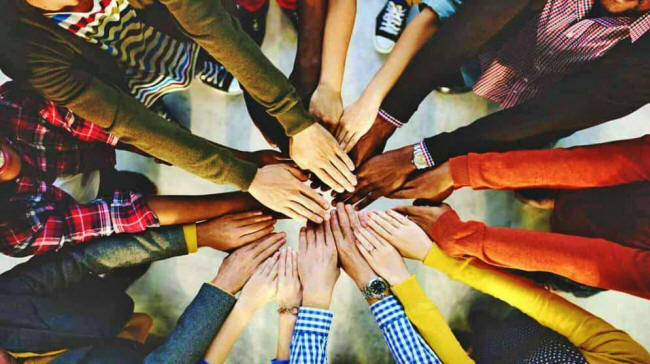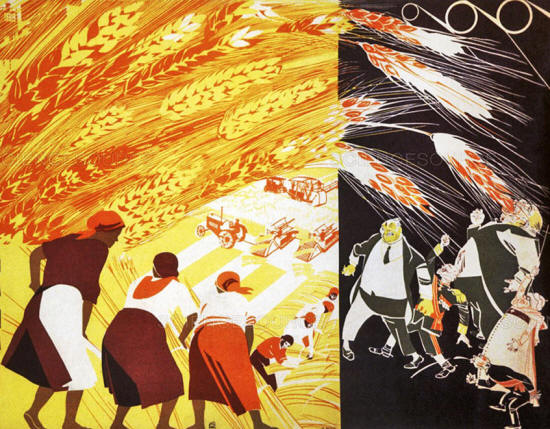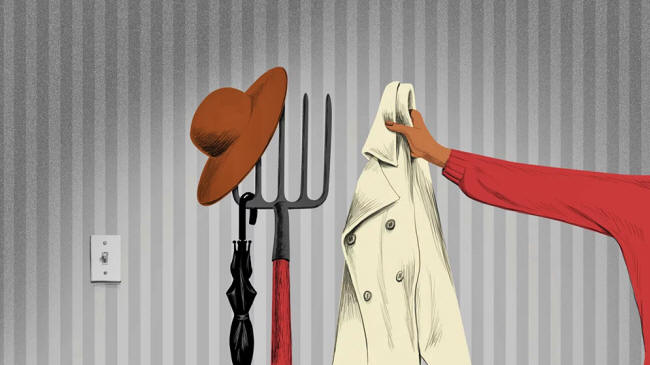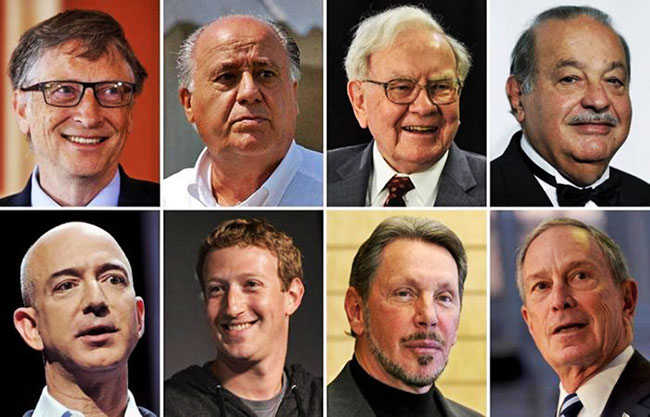|
from
Eudaimonia Website
Why Capitalism Led to Collapse, Not Prosperity and Maturity
Whether we couch it in
terms of higher tax rates or new kinds of taxes, like wealth taxes,
or breaking up monopolies, or even widespread social collapse and
degeneration - the underlying question remains.
Now, my three positions will either strike you as making eminent sense - or they'll rankle, maybe even make you angry.
So let's think about them for a moment.
Let's start here...
How do we justify billionaires - particularly in America? After all, billionaires are a "social construction" (as the kids say), too. Nobody's inherently a billionaire. We decide as a society to reward some activities and punish others and treat others with indifference - hence, billionaires.
The justification for billionaires - which is a product of American thinking, that then spread around the globe - goes something like this.
It's trickle-down
economics, in a slightly cleverer disguise.
It's self-evident to see that the rise of billionaires didn't result in prosperity, wealth, riches, fortune.
The average American is broke. He lives paycheck to paycheck. He's crushed by debt he can never repay. He lives a life of psycho-economic trauma, something like a neo-peasant, constantly worrying if his overlord will dispossess him just because the harvest - which is beyond his power to control - failed.
It's a terrible plight. Billionaires didn't make any of that go away - in fact, they seemed to make it happen.
How do we know...?
They have functioning healthcare, retirement, education, media, and so forth - and people have higher incomes and savings, too. Billionaires don't equal progress. In fact, the precise opposite is true - preventing millionaires from becoming billionaires results in progress.
That is why Europe is at a higher level of development than America today :
Billionaires don't equal progress. They equal a lack of progress...
And less billionaires equals progress - at least if we're talking about the same general kinds of societies, which is relatively rich democracies.
If we're thinking people, we should want to understand this question intimately - because it's a much more interesting one than American thinking, in particular, allows us to really wonder about.
After all, it cuts to the
heart of our stories of prosperity, the myths we tell ourselves
about how good lives come to be.
In other words, the American story of prosperity says that we are selfish, greedy, materialistic things - who, unless we are paid colossal fortunes, won't lift a finger to ever better, help, or improve anyone at all.
But is any of that true?
When we do, a great - and surprising truth - emerges. The people who have created the things that have benefited us all most have never done it for money.
Not once, ever, so far as I can tell...
Are you seeing a trend here?
Let's do a more concrete
example that connects all these dots now...
Well, the vaccine would save their life - so you'd charge them however much they had - you'd maximize your price, to maximize your profit. Bang! Everything...
Let's say they handed over their houses and savings to you. Now you own them. They get your vaccine. What are you to do with those houses, all that money? Well, you have to lease it back to those very people - maybe you call all that a "loan."
Now they're effectively
working for you - forever...
But why would you want to own everything?
Doing that only minimizes
the sum total of freedom, happiness, and possibility in society -
whereas you giving the vaccine away, or at least charging the
minimum, not the maximum for it, maximizes the freedom, happiness,
and possibility in society.
But that goes on to minimize a society's freedom, happiness, and possibility (or any other aspect of prosperity you'd care to think about.)
It's when owners minimize
prices, in order to break even, that society's freedom, happiness,
and possibility is maximized.
I say "the American story", but I'm being unfair - it should better be called,
My friend Jake put all his savings into a little microbrewery.
He's not there to maximize prices and profits, like some kind of corporate bean-counter.
He's there, in fact :
Do you see the
difference?
The greatest discoveries and inventions in history have never come from the greedy, selfish, and predatory - that's a myth capitalism wants you to believe, but it's badly wrong. They have all - every single one - come from imaginative, curious, determined minds, who found things so mysterious and awesome, they could only give them away, in the end, share them.
And I mean literally - Jake charges a few dollars a beer, but Salk charged you nothing for a polio vaccine.
Which one benefits you
more?
But they discover the
things that benefit us the most - so we are far better off with
fewer billionaires even if we have less iPhones, because
we will have more vaccines, antibiotics, and theories of relativity
(not to mention 1984s, art, literature, creativity.)
...destabilize a society.
When people grow short of those things, they grow angry, enraged, depressed, furious, as progress grinds to a halt, as they're charged their life savings and homes for just that next tiny morsel of progress.
They turn to tyrants and demagogues. They end up collapsing into authoritarianism and fascism.
That is one the great
lessons of modern history.
Now that we really understand how prosperity happens - through a series of wonderful gifts, that no civilized person can really hoard, as improbable as it sounds - what are billionaires really doing?
Well, they are essentially finding ways to "privatize" portions of those wonderful gifts, which are really all of our birthright. So there are the internet billionaires - finding ways to carve out chunks of Sir Tim's gift, which he gave to us all, but they want to keep only for themselves.
There are
pharma companies charging fortunes for
medicines like insulin, or vaccines - all of which
never could have come to be if capitalism was the driving force in
the first place.
But can anyone really "own" these things? Should they?
In that sense, billionaires aren't creating prosperity. In fact, they are sitting atop a series of public goods ,
...and simply finding ways to privatize their benefits, and, often socialize the losses accrued along the way.
When an internet billionaire carves off a chunk of the WWW - that's privatizing a public good. When a pharma company charges a huge fortune for some new drug - that's privatizing many public goods, which the discovery of that drug rested upon.
Billionaires aren't the 'creators of prosperity.'
They're it's
monopolists, its predators, the sharks cruising
the waters of civilization...
Well, think of what really happens when today's billionaires monopolize yesterday's public goods.
When there's a
billionaire charging you an arm and a leg for everything - which
should have been public in the first place - from medicine to
healthcare to education to media, what happens? The next
generation's Einsteins, Salks, and Berners-Lees are a lit less
likely, aren't they?
Now all those bright young kids who might have been tomorrow's great geniuses are slaving away at some crap dead-end McJob - or worse, McGig - instead of having the time, energy, money, to work on their breakthroughs.
Maybe those very kids get so frustrated and angry they turn to Trumps and Brexits. Maybe they end up stupid, ignorant fascists - instead of wise, gentle giants of the mind, heart, or soul. Bang! Implosion...
Remember when I said that happiness, freedom, and possibility are all minimized by too many billionaires, charging people too much, for things that they didn't create in the first place - trying to own freedom, happiness, and possibility???
That's an example of
exactly what it means...
In contradiction to the most basic beliefs of capitalism, when one person "owns" a thing that benefits all, nobody is really better off. That one person becomes something like a king - but everyone else becomes something like a peasant.
And then there's a feedback effect.
In the end, maybe that
very peasant becomes a fascist, in his desperation.
But we do so not out of our own narrow self-interest. But out of the desire to share, to endow, to give... The impulse, urge, and need, to create, discover, to transform.
We are all carpenters, seeking the mysterious, awesome, impossible truth of the wood. When we find it, if we are lucky enough to chance upon it, what greater happiness is there in life than sharing that mystery, that beauty, that moment?
That way lies freedom, possibility, meaning, and purpose my friends.
Ah, now you see...
Prosperity is a strange, improbable series of gifts. They are really just better just called civilization. The act of hoarding them, of profiteering on them, of aspiring to "own" them, is gross and immoral and uncivilized in the first place.
It is a form of self-destruction, of predation, of folly.
That is why billionaires
need societies more than societies need billionaires...
|






